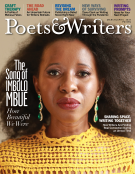Neither muscle nor mouth / devoted to one way of speaking. Every language // I borrow from somewhere else,” writes Threa Almontaser in The Wild Fox of Yemen (Graywolf Press, April 2021), winner of the Walt Whitman Award. In her debut Almontaser summons the language of her ancestors and family members, poets both contemporary and historical, experimental rock bands and rappers, and many more, to fashion an idiom that is both rebellious and reverent. Dedicated to the people of Yemen, the book offers a portrait of a country and its history and future. “Yemen has such an ancient and rich history, but with its current collapse, search engines show only the sad photos of starving kids,” says Almontaser. “I wanted to portray not only the war, but the beauty of Arabia Felix, of what it could still return to being.”

Threa Almontaser
Almontaser began publishing work while in graduate school at North Carolina State University; she says her teacher Dorianne Laux encouraged her to send out poems and would bring tote bags of old magazines to class for students to browse. Almontaser has since published poems in twenty outlets and says she submits to publications after “looking to see if they represent the same thing I am trying to represent, how rounded their voices are, if they focus on special issues, and recognize the levels of language a poem can hold.” She found one such publication in the Adroit Journal, which she was also drawn to for its masthead of editors who are emerging writers—an editorial group she says “gave me this feeling of relief, that the pub world wasn’t all who-you-know or the recognitions in your bio.” (“The fox is always questioning, particularly of institutions and the relationships therein,” she says of her approach.) Founded by Peter LaBerge when he was a sophomore in high school, the online journal annually releases three to five issues of poetry, prose, interviews, and art. “We’ve got our eyes on the horizon,” the editors write. “Send us writing that lives just between the land and the sky.” Submissions are currently closed.
When Almontaser submitted “Recognized Language” to Beloit Poetry Journal, Melissa Crowe, an editor of the print biannual at the time, said she wanted to accept the poem but with a few changes. Many writers would get nervous in that situation, says Almontaser, but “Melissa suggested revision in such a genuine way, and I had a blast working with her to get it to where it is now.” The four-part poem, which meditates on the forms language takes in the speaker’s memory, history, and dreams (“Languages slip into our mouths like second-hand / smoke,” says the speaker), appears in Issue 69.2 of the magazine, in addition to contributions from Daniel Arias-Gómez, Philip Metres, and Hillery Stone, among others. The editors say they are known “for publishing formally challenging poems, for printing the brutally honest and the unparaphrasable alongside the wryly funny, and lyrics that ring clear as bells.” Submissions open on June 1.
Almontaser says she also found herself in good company at Duende, which featured her poem “Feast, Beginning With a Kissed Blade” alongside work by Gabriel Amor and Sean Thomas Dougherty as part of the journal’s Food Issue. “I was delighted particularly to be in an issue on the theme of food, which to me sits on the same spoon as union and feelings of being rooted,” she says. Established in 2013, Duende is released twice a year online by students pursuing a BFA in writing at Goddard College in Plainfield, Vermont, and showcases poetry, prose, translations, hybrid work, and visual art. Submissions are currently closed.
After hearing poet Kaveh Akbar had been named the poetry editor of the Nation, Almontaser submitted “Catasterism,” which she describes as “a poem on foreign fathers meeting snow for the first time and their connection to resistance,” to the biweekly magazine of political and cultural news and commentary. “I felt comfortable submitting such a fragile piece to a place that held a Muslim in the masthead,” she says. Since becoming poetry editor of the Nation in September 2020, Akbar has published poems by Elisa Gabbert, Claire Schwartz, and Javier Velaza, among others. Submissions are open year-round via the Nation’s online submission manager.
When the Rumpus accepted Almontaser’s “Dream Interpretation” she was delighted to receive a “sweet and uplifting” acceptance letter from Cortney Lamar Charleston, who edits the outlet’s original poetry section with Carolina Ebeid. Almontaser says of the online publication, “The topics and the magnificent selection of art, comics, and media had snagged me as an early fan.” In addition to poetry, fiction, and nonfiction, the Rumpus covers art, humor, television, politics, music, and more, all with a focus on lifting up marginalized voices. Submissions open on June 1 for essays, July 1 for fiction, and July 15 for poetry.
Dana Isokawa is the senior editor of Poets & Writers Magazine.









